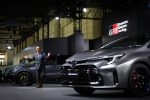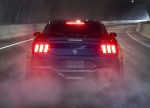
Akio Toyoda Believes EV’s Will Peak at 30% Market Share, Engines Will Surely Remain
In a recent statement, former Toyota Motor Corp CEO Akio Toyoda maintained his skepticism towards the widespread adoption of battery-electric vehicles (EVs). Despite his successor, Koji Sato, committing more resources to EV development, Toyoda envisions a future where hybrids and alternative technologies continue to dominate the global automotive market.
Toyoda, now serving as Toyota’s chairman, expressed his belief that EVs will peak at just 30% of global vehicle sales. Emphasizing the enduring significance of traditional engines, he stated, “Engines will surely remain,” in comments posted on the automaker’s internal publication as cited by Bloomberg. Overall, EV sales have subsided somewhat at 18% of the global market share and just 8% in the U.S.
Toyota, once considered a pioneer in the environmental movement, introduced the first mainstream hybrid-electric vehicle 25 years ago. The company offers hybrid versions across its product lineup, including popular models like the Corolla and Tundra. Despite this, Toyota has been cautious in embracing full EVs, only introducing its first two models, the Toyota bZ4X and Lexus RZ, for the 2023 model year.
Toyoda’s stance has faced criticism from environmental groups, with Toyota receiving regular scrutiny from organizations like the Union of Concerned Scientists. However, Toyoda insists that the auto industry’s response to climate change should not be dictated solely by regulations but rather guided by customer preferences.
While acknowledging the industry’s responsibility in addressing climate change, Toyoda opposes one-size-fits-all regulations pushing for a complete transition to battery-electric drivetrains. He contends that customers, not regulations or politics, should decide the future of automotive propulsion.
Sato, Toyota’s current CEO, has shown a willingness to embrace all-electric technology, announcing plans for new EV models, including a high-performance variant with breakthrough solid-state batteries that could yield remarkable range estimates. Despite this, Sato’s overall strategy aligns closely with Toyoda’s vision. Toyota recently announced plans to develop new internal combustion engines, primarily for use in hybrid packages.
Sato projects that EVs will account for just 1.5 million sales annually by 2026, representing 15% of Toyota’s total annual sales over the past decade. By 2030, he anticipates that EVs will reach 3 million sales, aligning with Toyoda’s vision of a 30% market share for electric vehicles.
In contrast to Toyota’s cautious approach, the Biden administration in the U.S. aims for EVs to constitute 50% of the market by the end of the decade. European analysts anticipate even higher figures. While China has yet to formalize guidelines, observers expect a push towards an all-EV approach in the mid-2030s.
Despite skepticism from industry executives like Toyoda, projections suggest that EVs could comprise 75% of global new vehicle sales by 2040, with all-electric models making up 44% of vehicles on the road. Toyoda’s perspective aligns with other industry leaders like Honda CEO Toshihiro Mibe, who also sees the benefits of a multipathway approach in the short to medium term but expresses openness to an all-EV future in the long term.


